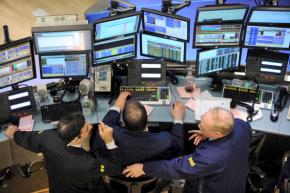Fat cats profiting off disaster
Natural disasters are allowing some capitalists to squeeze as much profit as possible out of food commodities in short supply, writes .
WHEN THE earth bakes, the markets catch fire.
Intense heat and the most severe drought in a hundred years have shrivelled a swath of Russian farmland from the Black Sea to Siberia, destroying the grain harvest and prompting the Medvedev government to ban exports in an effort to consolidate supplies.
In response, wheat prices have soared across the rest of the world. European prices have surged 80 percent in the past six weeks, while the grain markets in Chicago saw a 25 percent rise in a week. Dealers who bought wheat at fixed prices in advance have pocketed fortunes, while farmers back in Russia face destitution and despair.
Importing countries and multinational food companies have turned to the U.S., Australia, Argentina and the European Union. The Financial Times reports: "There are enough stocks left to bridge the gap…but no safety cushion. In other words, the weather between now and the harvest in December in Australia needs to be perfect."
Consumers can expect to pay more for bread and other staples before the year is out--then, maybe, if the weather isn't favorable, a lot more.

The FT continues: “Analysts and farming executives say the crisis is likely to accelerate the consolidation of Russian agriculture already under way, allowing big conglomerates to swoop on struggling small farmers.”
For every 100 million losers in the global economy, there's always a few thousand winners. One of the biggest recent winners in the lottery has been London trader Anthony Ward.
In October 2009, he started buying contracts to deliver cocoa last month. Five weeks ago, his hedge fund, Armajaro, took delivery of 240,100 tons, around 7 percent of annual world production. The effect was to drive prices up to their highest level for more than 30 years, yielding Mr. Ward and his investors huge profits.
The financial pages suggest that the profits will reach dizzying heights if the harvest in the Ivory Coast in October is as bad as dealers hope. In that case, land prices in the country will plummet--"towards zero," in the view of one commentator--creating the conditions for another lucrative land-grab.
The World Bank reported in early August, "Investors are targeting countries with weak laws, buying arable land on the cheap and failing to deliver on promises." Around 124 million acres of farmland in Africa are now owned by hedge funds.
THE HEDGE funds--"machines designed to loot shipwrecks,” in the memorable phrase of one banker--turned to food, farmland and the mineral riches of the Global South as rich pickings from the housing market dried up.
The second-largest hedge fund in the world, Paulson and Co., made billions betting that the sub-prime mortgage market in the U.S. would collapse. When it did, throwing hundreds of thousands of families out of their homes, fund boss John Paulson personally collected $3.3 billion. He is now reckoned to be the 45th richest person in the world.
Around a discreet corner from Paulson is found the commodity trading company Glencore, dealing in land, wheat, sugar, zinc, natural gas, etc., across the planet. It, too, emerged from the U.S. housing collapse in bullish mood and last year made clear profit of $2.8 billion from its newly focused operations.
Food grown on farmland owned by banks and hedge funds is not intended to feed local populations, but to be sold on the world commodity markets.
Toward this end, the London firm Central African Mining and Exploration, for example, has just bought 75,000 acres of fertile land in Mozambique to grow biofuels for export. Local people had understood the land was to be given or leased to 1,000 farming families displaced when a national park was established in order to attract tourists.
A government official explains that these people were "confused." No doubt.
What is striking about all of these operations--there are hundreds of others--is the impact they can have on the day-to-day lives of vast numbers of people, while remaining virtually anonymous and entirely unaccountable.
The notion that profit is all that matters when it comes to the production of food will strike many as skewed and even immoral. But it's strictly in line with the ethics of the market economy. When a smattering of malcontents in the business world expressed concern at Anthony Ward's cornering of the cocoa market, the Financial Times rushed to his defense with a robust editorial pointing out that he had "breached no rules."
And of course not. It's the rules themselves which rig the game, the system itself which generates injustice.
First published in the Belfast Telegraph.


